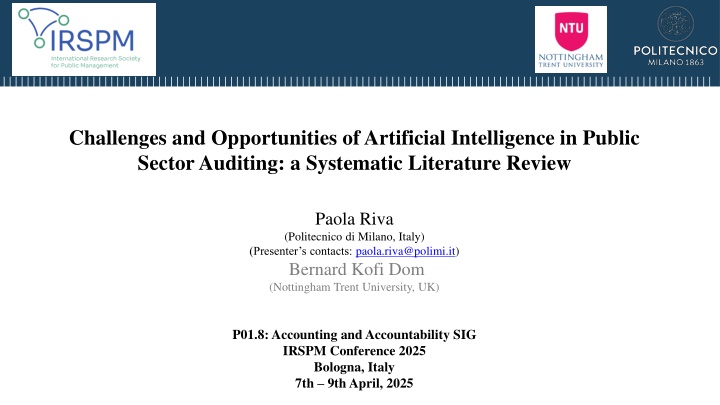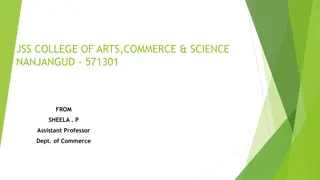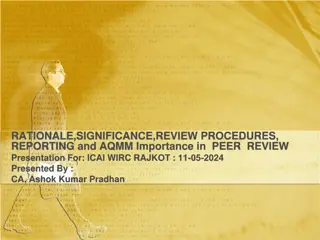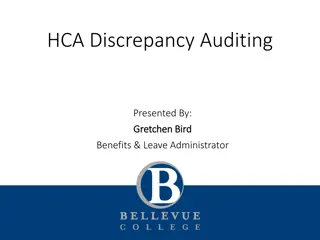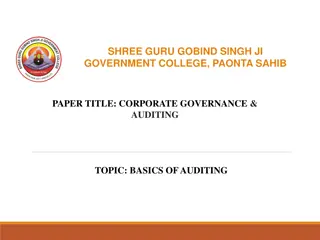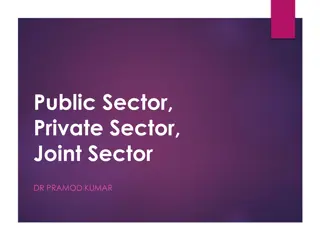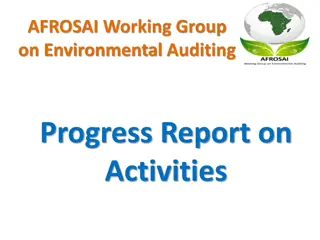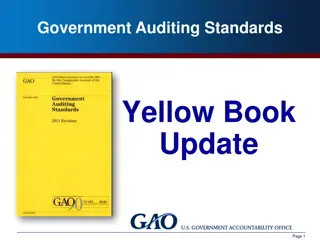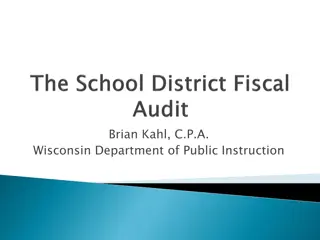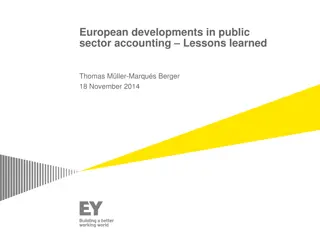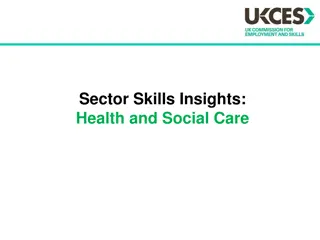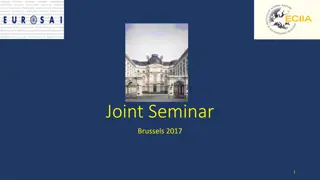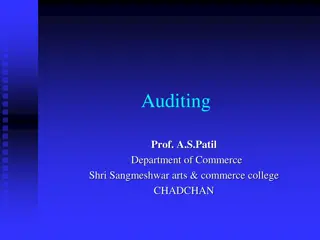Challenges and Opportunities of AI in Public Sector Auditing
AI has become a prominent topic impacting public sector auditing. This literature review explores the influence of AI on traditional auditing practices, highlighting challenges and opportunities for academia and practitioners. Methodologically, it aims to deepen understanding through systematic analysis and identification of future research directions pertinent to AI in public sector audits.
Download Presentation

Please find below an Image/Link to download the presentation.
The content on the website is provided AS IS for your information and personal use only. It may not be sold, licensed, or shared on other websites without obtaining consent from the author.If you encounter any issues during the download, it is possible that the publisher has removed the file from their server.
You are allowed to download the files provided on this website for personal or commercial use, subject to the condition that they are used lawfully. All files are the property of their respective owners.
The content on the website is provided AS IS for your information and personal use only. It may not be sold, licensed, or shared on other websites without obtaining consent from the author.
E N D
Presentation Transcript
Challenges and Opportunities of Artificial Intelligence in Public Sector Auditing: a Systematic Literature Review Paola Riva (Politecnico di Milano, Italy) (Presenter s contacts: paola.riva@polimi.it) Bernard Kofi Dom (Nottingham Trent University, UK) P01.8: Accounting and Accountability SIG IRSPM Conference 2025 Bologna, Italy 7th 9th April, 2025
AI: Artificial Intelligence Positive Negative Background AI has evolved as a buzzword , making it difficult to have a common definition across multiple disciplines (Samoili et al., 2021) Increasing debate on how AI influences organisations across different disciplines including public sector (e.g., Zuiderwijk et al., 2021; Wirtz et al., 2019; Agarwal, 2018) and audit (e.g., Ferry et al., 2022; Bandy, 2021) Using blockchain has shown to enhance auditors in guaranteeing data security and in generating trust amongst public sector organizations (Han et al., 2023) Renowned accounting firms use AI-sophisticated templates to enhance their integrated audit automation systems also used for public sector auditing (Zhang et al., 2020) FRC (2018) established that independent opinions are trusted when AI is employed for auditing financial records, boosting accountability and transparency. The use of AI in public sector presents different layers of challenges, which, if not well managed, are expected to disrupt effective decision-making, accounting, accountability and audit (Agostino et al., 2023) Public sector audit is increasingly under scrutiny for lack of transparency (Ferry & Midgley, 2024) and the use of AI poses some risks, e.g., potential biases (Patel and Uddin, 2022) and privacy concerns (Busuioc, 2021) Practice shows real-life examples of how AI influences public sector audit, e.g.: fraud detection, e.g., UK s HM Revenue and Customs for detection of fraudulent activities identification of inconsistencies and potential errors in financial reports, e.g., AI tool used by the US Social Security Administration to support judges review decisions wrongful convictions due to over-reliance on AI without human oversight in public financial systems, i.e., UK Post Office Horizon Scandal, with the AI-powered Horizon software falsely flagged financial discrepancies anecdotal and sparce knowledge on how AI use influences Public Sector Audit calls for a systematization 2 CHALLENGES & OPPORTUNITIESOF AI IN PUBLIC SECTOR AUDITING: SLR
Methodology_1 What is known about how AI use influences public sector audit? Systematic literature review (Kitchenham, 2004) Contribute rejuvenate systematization of knowledge in public sector (George et al., 2023): purpose of research: analyse in depth what has been written and which are the future challenges that academia needs to face in connection to the use of AI for public sector audit object of research: relationship between AI use and public sector audit, to better understand how the use of AI is transforming traditional public sector audit practices community targeted: audit experts, i.e. Scholars, interested in the research gaps and the opportunity for future research developments Practitioners, interested in examples of top-notch use of AI in public sector audit, challenges and opportunities so-far recognized and discussed. subject of the research: (human) authors, i.e., researchers with interest and expertise in Public Administration, Accounting and AI, with experience in conducting topical rigorous research to identify emerging gaps and analyse use cases. practice to support the review: coding scheme coupled with the Preferred Reporting Items for Systematic Reviews and Meta- Analyses (PRISMA) approach (Liberati et al., 2009) 3 CHALLENGES & OPPORTUNITIESOF AI IN PUBLIC SECTOR AUDITING: SLR
Methodology_2 TITLE-ABS ("Artificial Intelligence" AND ("Audit*")) AND SUBJAREA (BUSI) AND DOCTYPE ("ar" OR "re" OR "ch" ) (TI OR AB = ("Artificial Intelligence" AND "Audit*") AND (WC = (Business) OR (Business, Finance)) AND (DT = (Article) OR (Book Chapter)) What is known about how AI use influences public sector audit? from Scopus database (n = 232) Identify from Web of Science database (n = 86) Duplicated records (e = 70) PRISMA (Liberati et al., 2009) Non-duplicated records screened in Title, Abstract, and Source (n = 248) Screen Records non-relevant for study purpose (e = 45) Reports sought for full-text reports (n =203) Reports not retrieved (e = 65) Reports elected for full-text screening (n = 138) Elect Records non-relevant for study purpose (e = 9) Reports included (N = 129) Review 4 CHALLENGES & OPPORTUNITIESOF AI IN PUBLIC SECTOR AUDITING: SLR
Findings_1 What is known about how AI use influences public sector audit? 5 CHALLENGES & OPPORTUNITIESOF AI IN PUBLIC SECTOR AUDITING: SLR
more specific on public sector Findings_2 What is known about how AI use influences public sector audit? As a Phenomenon: changing the role of auditors, the skills required, and the potential for job displacement (e.g., Almufadda & Almezeini, 2022; Nguyen et al., 2024; Tiberius & Hirth, 2019) and the need to integrate AI in curricula to effectively prepare the auditors of the future (e.g., Baldwin- Morgan, 1995; Dalwai et al., 2022; Holmes & Douglass, 2022; Nouraldeen, 2023) ethical implications, risks, biases, and governance issues (e.g., Lehner et al., 2022; Grove et al., 2018; Laine et al., 2024; Kunz & Wirtz, 2024; etin Kumkumo lu & Kemal Kumkumo lu, 2023; Cecere et al., 2024; Munoko et al., 2020) intersection of AI with other emerging technologies like blockchain, big data analytics, and robotic process automation (e.g., Abu et al., 2024; Han et al., 2023; Atayah & Alshater, 2021; Gotthardt et al., 2020; Zem nkov , 2019; Mugwira, 2022; Kahyaoglu & Aksoy, 2021; Taneja & Arora, 2021; Arslan, 2024; Butijn, 2023; Maharajan et al., 2023) factors influencing the adoption, implementation, and use (e.g., Rahayu, 2021; Albawwat & Frijat, 2021; Seethamraju & Hecimovic, 2023; Noordin et al., 2022; Khuong et al., 2023; Thottoli, 2024; Anh et al., 2024) As a Resource: effects on quality, efficiency, accuracy, effectiveness and transparency of processes, among which financial reporting (e.g, Estep et al., 2024; Fedyk et al., 2022; Melnychenko, 2020; Silva et al., 2024; Hu et al., 2023; Koreff et al., 2023; Commerford et al., 2022; Al-Sayyed et al., 2021; Khan et al., 2021; Puthukulam et al., 2021; Al-Around, 2020; Raschke et al., 2018) use of explainable AI (XAI) techniques to favour transparency and interpretability of results (e.g., Lee, 2022; Tsakalakis et al., 2021; Zhang et al., 2022; Monteiro & Reynoso-Meza, 2023) for specific purposes, e.g., detect fraud, assess risks, and improve internal controls (e.g., Hajek & Henriques, 2017; Li & Vasarhelyi, 2018; Malik, 2020; Kahyaoglu & Aksoy, 2021; Boer et al., 2023; Crawford & Nilsson, 2023), audit government agencies, public assets, and ensure accountability in the public sector (e.g., Koreff et al., 2023), and use by tax administrations to improve efficiency, transparency, and combat tax evasion (e.g., Rahayu, 2021). 6 CHALLENGES & OPPORTUNITIESOF AI IN PUBLIC SECTOR AUDITING: SLR
Findings_3 What is known about how AI use influences public sector audit? Benefits Long-term cost-saving opportunities (Gotthardt et al., 2020) Reduced anomalies to ensure quality independent opinions (Meyer, 2019; Almufadda and Almezeini, 2022) Improved efficiency and effectiveness (Thottoli, 2024; Noordin, 2022; Almufadda and Almezeini, 2022) Barriers Cost of investment (Gotthardt et al., 2020; Almufadda and Almezeini, 2022) AI is high-risk & low-reward (Boillet, 2018; Kruskopf et al., 2019) Expertise & technical know-how (Thottoli, 2024) Fast-evolving nature of tech (Damerji and Salimi, 2021; Holmes and Douglass, 2022) Knowledge in accounting is necessary (Damerji and Salimi, 2021; Kavanagh and Drennan (2008) 7 CHALLENGES & OPPORTUNITIESOF AI IN PUBLIC SECTOR AUDITING: SLR
Discussion & Conclusion Governance Culture & AI Adoption AI s role in public sector audit is influenced by governance culture, regulatory frameworks, and institutional trust Big Four firms act as key players in shaping AI norms, but transparency in AI-driven public sector audits remains limited Awareness of Benefits & Risks AI enhances public sector audits by means of efficiency and effectiveness, but risks include bias, explainability issues, and over- reliance on algorithms. Public sector stakeholders require greater awareness of failures and successes of AI use for public audit to balance automation with professional judgment Revised Curriculum & Training Public sector audit curricula must integrate AI-related aspects as ethics, algorithmic accountability, and technical competencies which sectorial risks and benefits connected to public sector Upskilling public sector auditors to critically evaluate AI-driven insights to face public sector challenges, e.g., public value delivery Will AI Replace Public Sector Audit Practice? AI is used as trust-enhancing tool to support and augment, rather than substitute, the role of public sector auditors, as human oversight remains essential to face professional scepticism and complex judgment Essential elements for the future: development of hybrid governance models;regulatory oversight ensuring ethical AI deployment; stronger training and revised educational frameworks; continuous human judgment in AI-assisted practices; specific empirical research on AI use in public sector audit. 8 CHALLENGES & OPPORTUNITIESOF AI IN PUBLIC SECTOR AUDITING: SLR
References_1 Abu Huson, Y., Sierra-Garc a, L., & Garcia-Benau, M. A. (2024). A bibliometric review of information technology, artificial intelligence, and blockchain on auditing. Total Quality Management & Business Excellence, 35(1-2), 91-113. Agarwal, P. K. 2018. Public Administration Challenges in the World of AI and Bots. Public Administration Review 78(6):917 21. doi: 10.1111/puar.12979. Agostino, D., Bracci, E., Cruz, I., Jorge, S., Cardoso, R. L., & Louren o, R. (2023). Debate: Data science challenges to financial information in the public sector. Public Money & Management, 1-4. Albawwat, I., & Frijat, Y. (2021). An analysis of auditors perceptions towards artificial intelligence and its contribution to audit quality. Accounting, 7(4), 755-762. Almufadda, G., & Almezeini, N. A. (2022). Artificial intelligence applications in the auditing profession: a literature review. Journal of Emerging Technologies in Accounting, 19(2), 29-42. Al-Aroud, S. F. (2020). The impact of artificial intelligence technologies on audit evidence. Academy of Accounting and Financial Studies Journal, 24, 1-11. Al-Sayyed, S., Al-Aroud, S., & Zayed, L. (2021). The effect of artificial intelligence technologies on audit evidence. Accounting, 7(2), 281-288. Anh, N. T. M., Hoa, L. T. K., Thao, L. P., Nhi, D. A., Long, N. T., Truc, N. T., & Ngoc Xuan, V. (2024). The effect of technology readiness on adopting artificial intelligence in accounting and auditing in Vietnam. Journal of Risk and Financial Management, 17(1), 27. Arslan, M. (2024). Digitalisation in Accounting: Is It a Risk or an Opportunity?. In Impact of Digitalization on Reporting, Tax Avoidance, Accounting, and Green Finance (pp. 112-133). IGI Global. Atayah, O. F., & Alshater, M. M. (2021). Audit and tax in the context of emerging technologies: A retrospective analysis, current trends, and future opportunities. International Journal of Digital Accounting Research, 21. Baldwin-Morgan, A. A. (1995). Integrating artificial intelligence into the accounting curriculum. Accounting education, 4(3), 217-229. Bandy, Jack. 2021. Problematic Machine Behavior: A Systematic Literature Review of Algorithm Audits. Proceedings of the ACM on Human-Computer Interaction 5(CSCW1):74:1-74:34. doi: 10.1145/3449148. Boer, A., de Beer, L., & van Praat, F. (2023). Algorithm assurance: Auditing applications of artificial intelligence. Advanced Digital Auditing, 149. Busuioc, Madalina. 2021. Accountable Artificial Intelligence: Holding Algorithms to Account. Public Administration Review 81(5):825 36. doi: 10.1111/puar.13293. 9 CHALLENGES & OPPORTUNITIESOF AI IN PUBLIC SECTOR AUDITING: SLR
References_2 Butijn, B. J. (2023). Introduction to Advanced Information Technology. Advanced Digital Auditing, 15. Cecere, G., Jean, C., Le Guel, F., & Manant, M. (2024). Artificial intelligence and algorithmic bias? Field tests on social network with teens. Technological Forecasting and Social Change, 201, 123204. etin Kumkumo lu, S., & Kemal Kumkumo lu, A. (2023). Rethinking Non-discrimination Law in the Age of Artificial Intelligence. In Algorithmic Discrimination and Ethical Perspective of Artificial Intelligence (pp. 33-53). Singapore: Springer Nature Singapore. Commerford, B. P., Dennis, S. A., Joe, J. R., & Ulla, J. W. (2022). Man versus machine: Complex estimates and auditor reliance on artificial intelligence. Journal of Accounting Research, 60(1), 171-201. Crawford, J., & Nilsson, F. (2023). Integrating ESG risks into control and reporting: Evidence from practice in Sweden. In Handbook of Big Data and Analytics in Accounting and Auditing (pp. 255-277). Singapore: Springer Nature Singapore. Dalwai, T. A. R., Madbouly, A., & Mohammadi, S. S. (2022). An investigation of artificial intelligence application in auditing. In Artificial intelligence and COVID effect on accounting (pp. 101-114). Singapore: Springer Nature Singapore. Estep, C., Griffith, E. E., & MacKenzie, N. L. (2024). How do financial executives respond to the use of artificial intelligence in financial reporting and auditing?. Review of Accounting Studies, 29(3), 2798-2831. Fedyk, A., Hodson, J., Khimich, N., & Fedyk, T. (2022). Is artificial intelligence improving the audit process?. Review of Accounting Studies, 27(3), 938-985. Ferry, L., & Midgley, H. (2024). Are public sector accounts trusted? Exploring the verdict of the Public Administration and Constitutional Affairs Committee in the United Kingdom. Public Administration, 102(4), 1450-1467. Ferry, L., Radcliffe, V. S., & Steccolini, I. (2022). The future of public audit. Financial Accountability & Management, 38(3), 325-336. FRC. (2018). Blockchain and the future of corporate reporting How does it measure up? Financial Reporting Council. Available at. https://www.frc.org.uk/getattachment/58866565-ab3b-44d3-93e1-1ef7158968d5/Blockchain-and-the-future-of-corporate-reporting-how-does-it-measure-up- (June-2018).pdf (Accessed: 21 December 2023). George, B., Andersen, L. B., Hall, J. L., & Pandey, S. K. (2023). Writing impactful reviews to rejuvenate public administration: A framework and recommendations. Public administration review, 83(6), 1517-1527. Gotthardt, M., Koivulaakso, D., Paksoy, O., Saramo, C., Martikainen, M., & Lehner, O. (2020). Current state and challenges in the implementation of smart robotic process automation in accounting and auditing. ACRN Journal of Finance and Risk Perspectives. 10 CHALLENGES & OPPORTUNITIESOF AI IN PUBLIC SECTOR AUDITING: SLR
References_3 Grove, H., Clouse, M., Schaffner, L., & Xu, T. (2018). Monitoring AI progress for corporate governance. Hajek, P., & Henriques, R. (2017). Mining corporate annual reports for intelligent detection of financial statement fraud A comparative study of machine learning methods. Knowledge-Based Systems, 128, 139-152. Han, H., Shiwakoti, R. K., Jarvis, R., Mordi, C., & Botchie, D. (2023). Accounting and auditing with blockchain technology and artificial Intelligence: A literature review. International Journal of Accounting Information Systems, 48, 100598. Holmes, A. F., & Douglass, A. (2022). Artificial intelligence: Reshaping the accounting profession and the disruption to accounting education. Journal of Emerging Technologies in Accounting, 19(1), 53-68. Hu, K. H., Chen, F. H., Hsu, M. F., & Tzeng, G. H. (2023). Governance of artificial intelligence applications in a business audit via a fusion fuzzy multiple rule-based decision-making model. Financial Innovation, 9(1), 117. Kahyaoglu, S. B., & Aksoy, T. (2021). Artificial intelligence in internal audit and risk assessment. In Financial ecosystem and strategy in the digital era: Global approaches and new opportunities (pp. 179-192). Cham: Springer International Publishing. Khan, R., Adi, E., & Hussain, O. (2021). AI-based audit of fuzzy front end innovation using ISO56002. Managerial Auditing Journal, 36(4), 564-590. Khuong, N. V., Anh, L. H. T., Ha, L. T. N., Cuong, L. V., Ngan, N. P. T., Thu, H. T. M., & Minh, L. K. (2023). FactorsAffecting Decision to AdoptArtificial Intelligence During COVID-19 Pandemic Period: Evidence from PLS-SEM and fsQCA. Vision, 09722629221149847. Kitchenham, B. (2004). Procedures for performing systematic reviews. Keele, UK, Keele University, 33(2004), 1-26. ISSN:1353-7776 Koreff, J., Baudot, L., & Sutton, S. G. (2023). Exploring the impact of technology dominance on audit professionalism through data analytic-driven healthcare audits. Journal of Information Systems, 37(3), 59-80. Kunz, W. H., & Wirtz, J. (2024). Corporate digital responsibility (CDR) in the age of AI: implications for interactive marketing. Journal of Research in Interactive Marketing, 18(1), 31-37. Laine, J., Minkkinen, M., & M ntym ki, M. (2024). Ethics-based AI auditing: A systematic literature review on conceptualizations of ethical principles and knowledge contributions to stakeholders. Information & Management, 103969. Lee, S. C. (2022). A black box approach to auditing algorithms. Issues In Information Systems, 23(2). 11 CHALLENGES & OPPORTUNITIESOF AI IN PUBLIC SECTOR AUDITING: SLR
References_4 Lehner, O. M., Ittonen, K., Silvola, H., Str m, E., & W hrleitner, A. (2022). Artificial intelligence based decision-making in accounting and auditing: ethical challenges and normative thinking. Accounting, Auditing & Accountability Journal, 35(9), 109-135. Li, Q., & Vasarhelyi, M. (2018). Developing a cognitive assistant for the audit plan brainstorming session. The International Journal of Digital Accounting Research, 18(January), 119-140. Liberati, A., Altman, D. G., Tetzlaff, J., Mulrow, C., G tzsche, P. C., Ioannidis, J. P. A., Moher, D. (2009). The PRISMA statement for reporting systematic reviews and Meta-analyses of studies that evaluate health care interventions: Explanation and elaboration. PLoS Medicine, 6(7), Article e1000100. https://doi.org/10.1371/journal.pmed.1000100 Maharajan, K., Kumar, A. S., El Emary, I. M., Sharma, P., Latip, R., Mishra, N., ... & Sharma, M. (2023). Blockchain methods and data-driven decision making with autonomous transportation. In Effective AI, Blockchain, and E-Governance Applications for Knowledge Discovery and Management (pp. 176- 194). IGI Global. Malik, S. (2020). The changing face of regulatory, compliance and audit. The AI Book: The Artificial Intelligence Handbook for Investors, Entrepreneurs and FinTech Visionaries, 223-224. Melnychenko, O. (2020). Assessment of financial security of an enterprise on the basis of behavioral economics. Bulletin Of The Cherkasy Bohdan Khmelnytsky National University. Economic Sciences, 44-59. Monteiro, W. R., & Reynoso-Meza, G. (2023). A multi-objective optimization design to generate surrogate machine learning models in explainable artificial intelligence applications. EURO Journal on Decision Processes, 11, 100040. Mugwira, T. (2022). Internet Related Technologies in the auditing profession: A WOS bibliometric review of the past three decades and conceptual structure mapping: Tecnolog as relacionadas con Internet en la profesi n de auditor: Una revisi n bibliom trica de la WOS de las ltimas tres d cadas y un mapa de la estructura conceptual. Revista de Contabilidad-Spanish Accounting Review, 25(2), 201-216. Munoko, I., Brown-Liburd, H. L., & Vasarhelyi, M. (2020). The ethical implications of using artificial intelligence in auditing. Journal of business ethics, 167(2), 209-234. Nguyen, P. T., Kend, M., & Le, D. Q. (2024). Digital transformation in Vietnam: the impacts on external auditors and their practices. Pacific Accounting Review, 36(1), 144-160. 12 CHALLENGES & OPPORTUNITIESOF AI IN PUBLIC SECTOR AUDITING: SLR
References_5 Noordin, N. A., Hussainey, K., & Hayek, A. F. (2022). The use of artificial intelligence and audit quality: An analysis from the perspectives of external auditors in the UAE. Journal of Risk and Financial Management, 15(8), 339. Nouraldeen, R. M. (2023). The impact of technology readiness and use perceptions on students adoption of artificial intelligence: the moderating role of gender. Development and Learning in Organizations: An International Journal, 37(3), 7-10. Patel, P., & Uddin, M. N. (2022). AI for algorithmic auditing: mitigating bias and improving fairness in big data systems. International Journal of Social Analytics, 7(12), 39-48. Puthukulam, G., Ravikumar, A., Sharma, R. V. K., & Meesaala, K. M. (2021). Auditors perception on the impact of artificial intelligence on professional skepticism and judgment in Oman. Universal Journal of Accounting and Finance, 9(5), 1184-1190. Rahayu, S. K. (2021). Utilization of artificial intelligence in tax audit in Indonesia. Management and Accounting Review (MAR), 20(3), 135-157. Raschke, R. L., Saiewitz, A., Kachroo, P., & Lennard, J. B. (2018). AI-enhanced audit inquiry: A research note. Journal of Emerging Technologies in Accounting, 15(2), 111-116. Samoili, S., L pez Cobo, M., Delipetrev, B. (2021). AI watch, defining artificial intelligence 2.0 : towards an operational definition and taxonomy for the AI landscape, Publications Office of the European Union. European Commission, Joint Research Centre. https://data.europa.eu/doi/10.2760/019901 Seethamraju, R., & Hecimovic, A. (2023). Adoption of artificial intelligence in auditing: An exploratory study. Australian Journal of Management, 48(4), 780-800. Silva, L., Serra, S., & Barbosa, E. (2024). Influence of artificial intelligence on auditing: Perception of audit professionals. In Artificial Intelligence Approaches to Sustainable Accounting (pp. 149-167). IGI Global. Taneja, E., & Arora, S. (2021). Impact of AI and Block Chain on Accounts, Finance, Valuations and Auditing Indian Perspective. Ethics and Sustainability in Accounting and Finance, Volume III, 205-214. Tiberius, V., & Hirth, S. (2019). Impacts of digitization on auditing: A Delphi study for Germany. Journal of International Accounting, Auditing and Taxation, 37, 100288. Thottoli, M. M. (2024). Leveraging information communication technology (ICT) and artificial intelligence (AI) to enhance auditing practices. Accounting Research Journal, 37(2), 134-150. 13 CHALLENGES & OPPORTUNITIESOF AI IN PUBLIC SECTOR AUDITING: SLR
References_6 Tsakalakis, N., Stalla-Bourdillon, S., Carmichael, L., Huynh, T. D., Moreau, L., & Helal, A. (2021). The dual function of explanations: Why it is useful to compute explanations. Computer Law & Security Review, 41, 105527. Wirtz, Bernd W., and Wilhelm M. M ller. 2019. An Integrated Artificial Intelligence Framework for Public Management. Public Management Review 21(7):1076 1100. doi: 10.1080/14719037.2018.1549268. Zem nkov , A. (2019). Artificial intelligence and blockchain in audit and accounting: Literature review. wseas Transactions on Business and Economics, 16(1), 568-581. Zhang, Y., Xiong, F., Xie, Y., Fan, X., & Gu, H. (2020). The impact of artificial intelligence and blockchain on the accounting profession. IEEE Access, 8, 110461-110477. Zhang, C. A., Cho, S., & Vasarhelyi, M. (2022). Explainable artificial intelligence (XAI) in auditing. International Journal of Accounting Information Systems, 46, 100572. Zuiderwijk, Anneke, Yu-Che Chen, and Fadi Salem. 2021. Implications of the Use of Artificial Intelligence in Public Governance: A Systematic Literature Review and a Research Agenda. Government Information Quarterly 38(3):101577. doi: 10.1016/j.giq.2021.101577. UK s HMRC: https://www.gov.uk/government/organisations/hm-revenue-customs AI at SSA (US): https://www.ssa.gov/ai/ 14 CHALLENGES & OPPORTUNITIESOF AI IN PUBLIC SECTOR AUDITING: SLR
Challenges and Opportunities of Artificial Intelligence in Public Sector Auditing: a Systematic Literature Review Paola Riva (Politecnico di Milano, Italy) (Presenter s contacts: paola.riva@polimi.it) Bernard Kofi Dom (Nottingham Trent University, UK) P01.8: Accounting and Accountability SIG IRSPM Conference 2025 Bologna, Italy 7th 9th April, 2025
